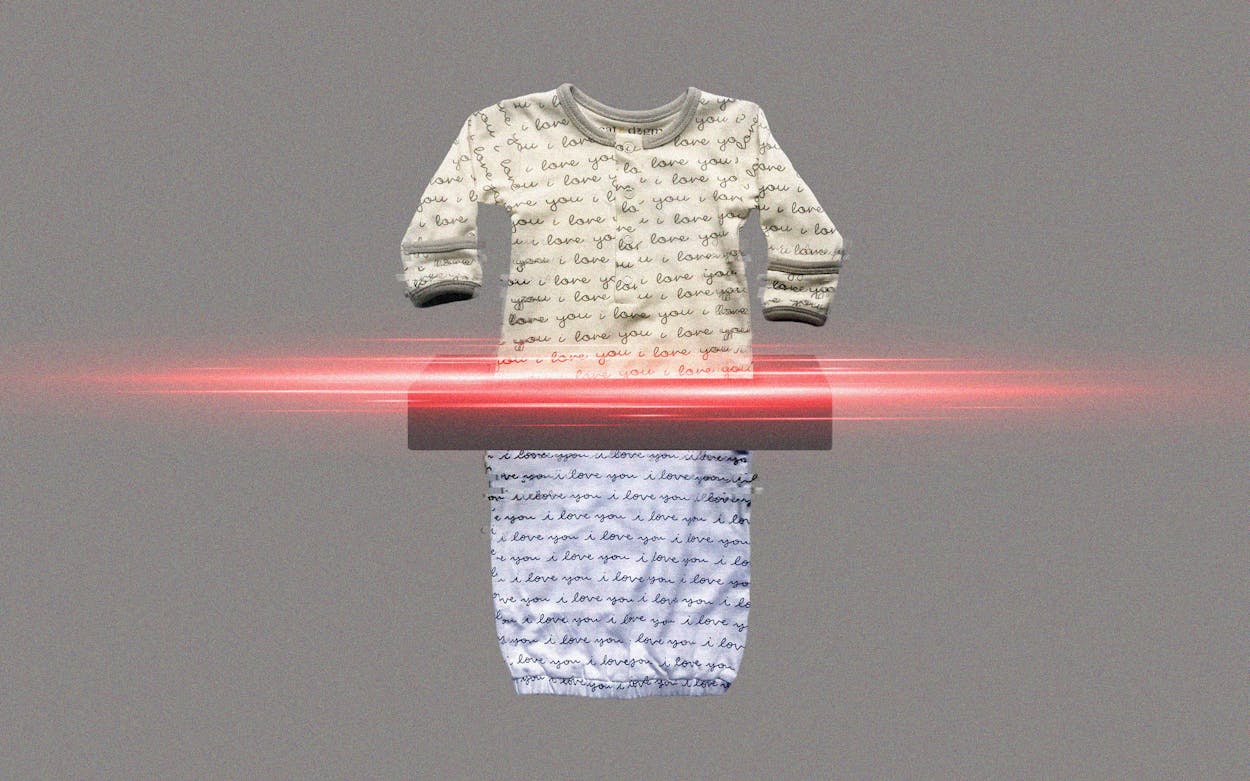The Target Corporation is used to defending itself. That is, it’s used to playing the role of the defendant, often in federal copyright courts, where it faces off against much smaller businesses. In 2021, California company Globalo LLC sued Target for selling a product that infringed on a patent for a curling iron caddy. In 2019, a Georgia woman named Emily Golub, the founder of a meal-kit service called Garnish & Gather, came after the big-box behemoth for copying her name and logo when it launched its Good & Gather line of foodstuffs. Target has even angered fellow major players, such as London fashion house Burberry, which sued the chain in 2018 for allegedly ripping off several of its iconic plaids. But all of those cases were eventually settled out of court. Last month, though, a David took on Target’s Goliath and actually won.
The David in question is Austin’s Adrian Layne, who has been designing and selling baby clothes under the label Cat & Dogma since 2015 (though she began selling hand-sewn garments at artisan fairs as far back as 2008). Her hottest-ticket items were garments illustrated with her “I love you” print. Layne designed it herself, and it was simple and straightforward, with the phrase drawn out in cursive and repeated in such a way as to make the pattern seem almost striped. She sold bibs, blankets, hats, and onesies in the design, both on her website and through other retailers such as Hatched Market and SnapdragonsBaby, which would buy her products wholesale. Up until recently, it was her most profitable design.
Layne only found out that Target was offering something similar in 2019, when one of her sales reps accused her of working with the chain store behind the representatives’ backs. “I wish I was working with Target, but no,” Layne recalls saying. Layne looked up the item on Target’s website and was at first flattered to see the familiar script on a onesie that came in a three-pack from one of Target’s in-house brands, Cloud Island. “I thought, ‘Oh wow, that’s so sweet that Target likes my designs,’ ” Layne says. But in retail, copying isn’t the sincerest form of flattery—it’s theft. “My sales rep said, ‘We’re going to have a hard time selling your products if they’re already being sold in Target.’ ” When Layne visited a store in person, she saw “I love you” scrawled across onesies, nightgowns, and playsuits. Picturing a mountain of her own soon-to-be-unsellable “I love you” inventory, Layne decided to find a copyright lawyer and take Target to court.
You cannot, of course, copyright the phrase “I love you,” which Layne was reminded of when the case was initially dismissed in the U.S. District Court for the Western District of Texas, not long after she and her lawyers filed suit in October 2019. But the similarities between Cat & Dogma’s design and Target’s went beyond the written word, and the Fifth Circuit Court of Appeals reinstated the case in October 2021, two years after Layne first filed. (Texas Monthly reached out to Target for comment and did not hear back by press time.)
“Target does this a lot, and they always settle out of court. They offered me a settlement out of court, and it just wasn’t something I felt was justifiable,” Layne says. “I would have been settling for something that was undervalued [Target was offering her far less than what she suspected it had made from her copied print], and I would have had to keep quiet,” Layne says. “I just couldn’t let them get away with it. If I lost, I lost, but if I went out fighting, it’s something I could be proud of.”
After more than two years of legal kick-the-can motions and orders filed by Layne’s two lawyers and Target’s six or seven, the trial began in mid-December 2022. “It’s rare for copyright cases to go to trial,” says her attorney James H. Freeman of Sanders Law Group, who says he’s participated in roughly six hundred copyright suits. “But in this particular case, both sides were adamant in their position.” No one was arguing that the designs weren’t nearly identical, but Target insisted that the similarities were due to a coincidental interpretation of an extremely common phrase. Layne, Freeman, and his cocounsel, Craig Sanders, had a different take. “What we were saying is, ‘Yeah, anyone can use the phrase “I love you,” and in fact many of your competitors have used the phrase “I love you” on pajamas, but they don’t look anything like that,’ ” Freeman says. “So how is it that Target came out with that virtually identical graphic layout?”
In a report filed by one of Cat & Dogma’s expert witnesses and viewed by Texas Monthly, Valerie B. Cooper, a consultant in the garment industry, wrote that “it is common for large retail chain department stores and ‘big box’ retailers such as Target to ‘Knock Off’ designs that have already achieved a level of popularity in the consumer market.” There are databases and software that track such things, wrote Cooper, and “thus, I conclude that Target had access to C&D’s designs before it went to market with its own knock-off items which, as shown below, are virtually identical to C&D’s works.” (Target’s lawyers filed a motion to exclude Cooper’s testimony, but the judge denied it.)
The trial lasted two days, then jurors deliberated for one, ultimately agreeing that Target had infringed on Layne’s copyright. The jury awarded Layne $1 million in damages, which was lower than the $10.4 million she’d asked for. Still, Layne is delighted by what she and her lawyers accomplished. “We didn’t have the army that they had in court, so I’m very proud of that,” she says. Freeman thinks this will deter Target from ripping off smaller designers. “I definitely think they’ll proceed with caution, you know, because not only did they lose the damages that the jury awarded, but they also had to pay their lawyers.” If nothing else, it will give independent creators hope that they, too, can stand up to such a behemoth—and win.
Nevertheless, it’s hard to imagine Target altering its business model that much, a model that once earned it the Fast Company headline “Some companies rip off products. Target imitates entire brands.” Layne’s not so sure the company will change its ways. “They’re always going to have people that go after them for this, but they have the resources to fight it off and still make money,” she says. She’s still waiting to see if Target will pay out or if it will appeal the judgment, which it has until January 27 to do. Layne hopes she won’t have to spend another year winding through the court system, but for now, she’s just happy to get back to the business of baby clothes. The “I love you” print, which is still available on her website and at other retailers, remains one of her top sellers.
- More About:
- Style & Design
- Austin








